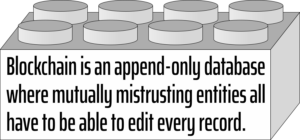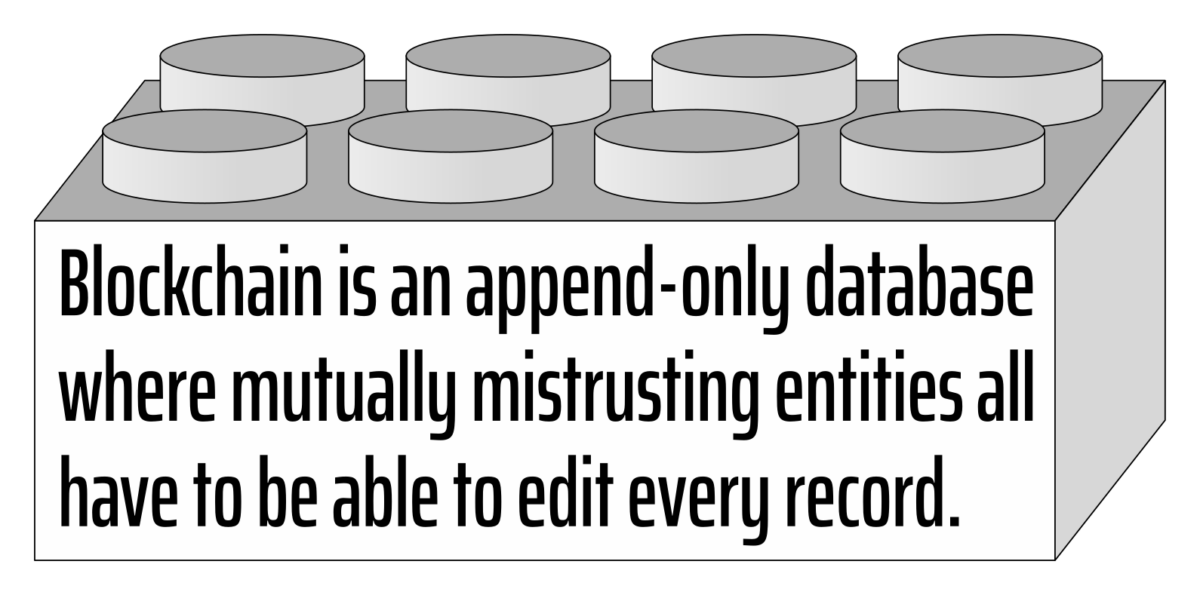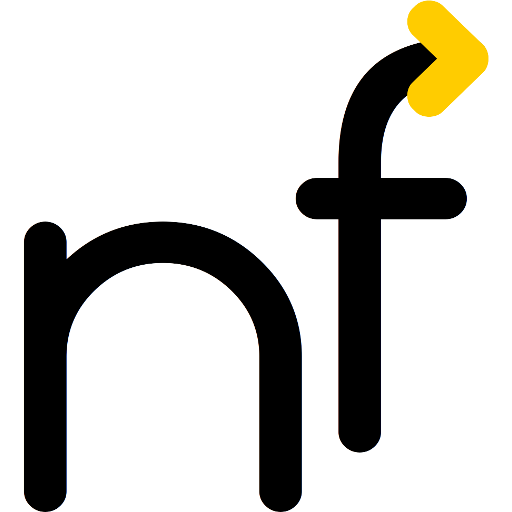
People often try to claim blockchain use cases without much deliberation. Here is a condensed, quotable version of «Hitchhiker’s Guide to the Blockchain» and «Data lifecycle questions, not only for Blockchains».
Blockchain is an append-only database where mutually mistrusting entities all have to be able to edit every record.
Marcel Waldvogel
A German 🇩🇪 version of this short message is here: «Blockchain in aller Kürze».
There are some more properties, such as, generally, an unspecified group of entities, public visibility and immutability (some of which follow from the above). More information and background in «Hitchhiker’s Guide to the Blockchain» and «Data lifecycle questions, not only for Blockchains».
The following statement can be seen as kind of a corollary to the above.
Blockchain is too complicated and inflexible for most applications, as it is a specialized solution to a very complex problem, which is unlikely to occur outside decentralized cryptocurrencies.
Tiny simplifications of the problem result in massively simpler solutions.
Marcel Waldvogel
We can learn a lot from the blockchain experiments, predecessors, and alternatives; most often, you will, however, want to have a smaller, more manageable subset of blockchain functions, such as transparency (not immutability) or consistency (not consensus). A lot of this can be flexibly achieved with timestamping and is also easier to fit into existing legal frameworks.
More on the blockchain ecosystem here and especially in the simple, humorous, yet thorough article «Hitchhiker’s Guide to the Blockchain».
Blockchain ecosystem
More posts in the blockchain ecosystem here, with the latest here:
- The year in review
 This is the time to catch up on what you missed during the year. For some, it is meeting the family. For others, doing snowsports. For even others, it is cuddling up and reading. This is an article for the latter.
This is the time to catch up on what you missed during the year. For some, it is meeting the family. For others, doing snowsports. For even others, it is cuddling up and reading. This is an article for the latter. - NFTs are unethical
 As an avid reader, you know my arguments that neither NFT nor smart contracts live up to their promises, and that the blockchain underneath is also more fragile and has a worse cost-benefit ratio than most believe. Similarly, I also claim the same for the metaverses built on top of them all. And that the… Read more: NFTs are unethical
As an avid reader, you know my arguments that neither NFT nor smart contracts live up to their promises, and that the blockchain underneath is also more fragile and has a worse cost-benefit ratio than most believe. Similarly, I also claim the same for the metaverses built on top of them all. And that the… Read more: NFTs are unethical - Inefficiency is bliss (sometimes)
 Bureaucracy and inefficiency are frowned upon, often rightly so. But they also have their good sides: Properly applied, they ensure reliability and legal certainty. Blockchain disciples want to “improve” bureaucracy-ridden processes, but achieve the opposite. Two examples:
Bureaucracy and inefficiency are frowned upon, often rightly so. But they also have their good sides: Properly applied, they ensure reliability and legal certainty. Blockchain disciples want to “improve” bureaucracy-ridden processes, but achieve the opposite. Two examples: - The FTX crypto exchange and its spider web
 Yesterday, the U.S. Securities and Exchange Commission (SEC) released its indictment against Sam Bankman-Fried. It details the financial entanglements of FTX, Alameda Research and more than a hundred other companies and individuals. We have tried to disentangle these allegations somewhat for you.
Yesterday, the U.S. Securities and Exchange Commission (SEC) released its indictment against Sam Bankman-Fried. It details the financial entanglements of FTX, Alameda Research and more than a hundred other companies and individuals. We have tried to disentangle these allegations somewhat for you. - Web3 for data preservation? (Or is it just another expensive P2P?)
 Drew Austin raises an important question in Wired: How should we deal with our accumulated personal data? How can we get from randomly hoarding to selection and preservation? And why does his proposed solution of Web3 not work out? A few analytical thoughts.
Drew Austin raises an important question in Wired: How should we deal with our accumulated personal data? How can we get from randomly hoarding to selection and preservation? And why does his proposed solution of Web3 not work out? A few analytical thoughts. - Rejuvenation for Pro Senectute through NFT and Metaverse?
 Pro Senectute beider Basel, a foundation to help the elderly around Basel, launched its NFT project last week and already informed about its Metaverse commitment beforehand. According to a media release, Michael Harr, managing director of the 15-million Basel-based company, wants to use the purchase of these “properties” in a “central location” in two online… Read more: Rejuvenation for Pro Senectute through NFT and Metaverse?
Pro Senectute beider Basel, a foundation to help the elderly around Basel, launched its NFT project last week and already informed about its Metaverse commitment beforehand. According to a media release, Michael Harr, managing director of the 15-million Basel-based company, wants to use the purchase of these “properties” in a “central location” in two online… Read more: Rejuvenation for Pro Senectute through NFT and Metaverse?



